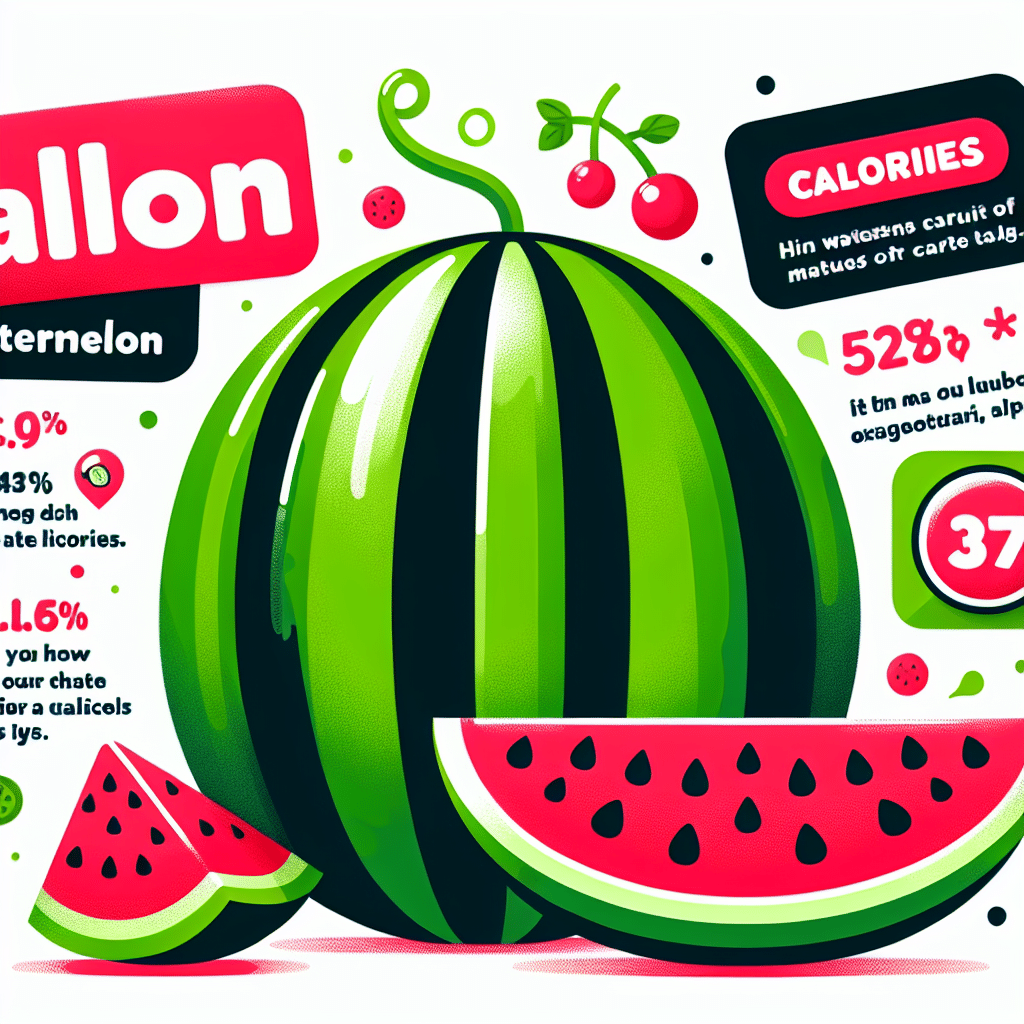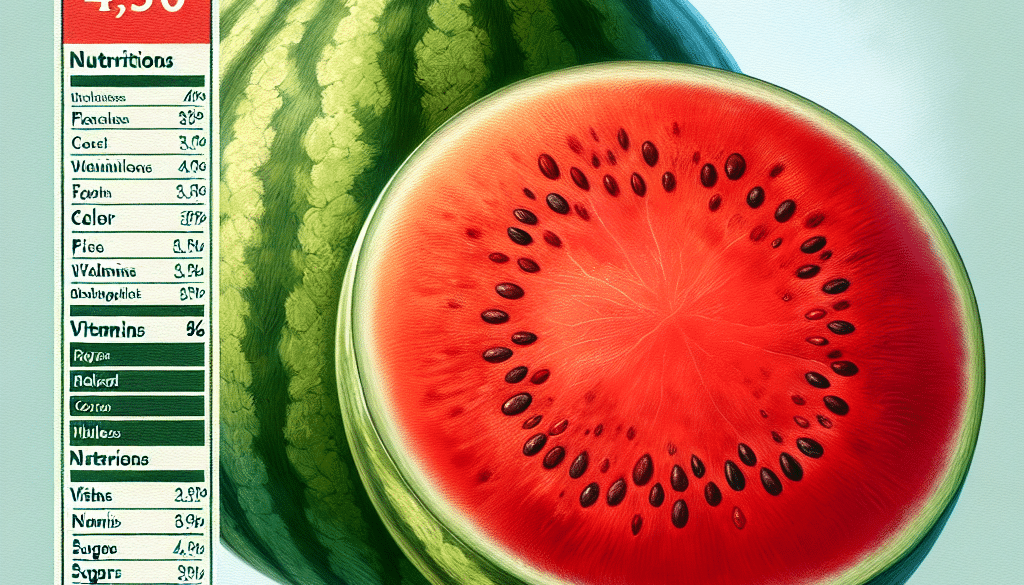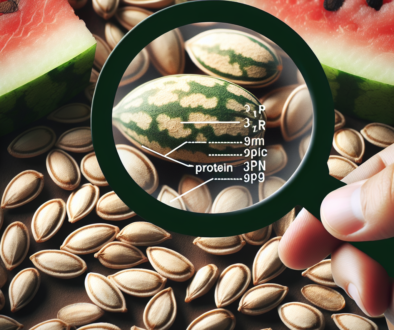How Many Calories in a Large Watermelon? Get the Facts
-
Table of Contents
- Calories in a Large Watermelon: Unveiling the Nutritional Facts
- Understanding Watermelon Calorie Content
- Nutritional Profile of Watermelon
- Health Benefits of Watermelon
- How to Incorporate Watermelon into Your Diet
- Conclusion: The Caloric Breakdown of a Large Watermelon
- Discover ETprotein’s Watermelon Seed Protein Products
Calories in a Large Watermelon: Unveiling the Nutritional Facts

Watermelon is a staple summer fruit that not only offers a refreshing taste but also comes packed with nutrients and health benefits. It’s a common favorite at picnics and beach outings, but when it comes to calorie content, many people are often curious about how much they’re consuming when indulging in a large watermelon. In this article, we’ll dive into the nutritional facts of a large watermelon, explore its calorie content, and discuss the health benefits associated with this juicy fruit.
Understanding Watermelon Calorie Content
When it comes to calorie count, watermelon is considered a low-calorie fruit. This is because it contains a high water content—about 92%—which makes it both hydrating and low in calories. To understand how many calories are in a large watermelon, we need to break down the measurements.
A typical large watermelon weighs approximately 20 pounds (9 kilograms). The edible part of the watermelon, excluding the rind, usually constitutes around 66% of the total weight. Therefore, a large watermelon would yield approximately 13.2 pounds (6 kilograms) of edible fruit.
According to the United States Department of Agriculture (USDA), watermelon contains about 30 calories per 100 grams. Using this information, we can calculate the calorie content of a large watermelon:
- 6,000 grams (edible part of a large watermelon) x 30 calories/100 grams = 1,800 calories
Therefore, a large watermelon contains roughly 1,800 calories in total. However, it’s important to note that it’s quite uncommon for a person to consume an entire large watermelon in one sitting. A more typical serving size might be a 1-inch thick slice from a 10-inch diameter watermelon, which equates to about 86 calories.
Nutritional Profile of Watermelon
Aside from its calorie content, watermelon is rich in vitamins, minerals, and antioxidants. Here’s a breakdown of the key nutrients found in watermelon:
- Vitamin C: A powerful antioxidant that supports the immune system.
- Vitamin A: Important for eye health and immune function.
- Potassium: An essential mineral that helps regulate fluid balance and blood pressure.
- Magnesium: Involved in over 300 enzymatic reactions in the body, including energy production.
- Fiber: Although watermelon is not high in fiber, it does contain some, which aids in digestion.
- Lycopene: A phytonutrient known for its antioxidant properties and potential to reduce the risk of certain diseases.
Watermelon also contains other beneficial compounds such as citrulline, which may improve exercise performance and cardiovascular health.
Health Benefits of Watermelon
Consuming watermelon is not only a tasty way to stay hydrated but also brings several health benefits:
- Hydration: Due to its high water content, watermelon helps to keep you hydrated, which is essential for maintaining healthy body functions.
- Weight Management: Being low in calories and high in water, watermelon can help you feel full without consuming a lot of calories, making it a great snack for weight management.
- Antioxidant Properties: The vitamins and lycopene in watermelon act as antioxidants, protecting your cells from damage caused by free radicals.
- Heart Health: The potassium, magnesium, and citrulline in watermelon contribute to heart health by improving blood flow and reducing blood pressure.
- Anti-inflammatory Effects: Lycopene has been shown to have anti-inflammatory properties, which may help reduce inflammation and associated diseases.
How to Incorporate Watermelon into Your Diet
Watermelon is versatile and can be enjoyed in various ways. Here are some ideas to incorporate watermelon into your diet:
- Enjoy it fresh and chilled as a snack or dessert.
- Add it to salads for a refreshing twist.
- Make watermelon juice or smoothies for a hydrating beverage.
- Use it in salsas or gazpachos for a unique flavor combination.
- Grill watermelon slices for a smoky, sweet side dish.
Conclusion: The Caloric Breakdown of a Large Watermelon
In summary, a large watermelon contains approximately 1,800 calories in total, but a typical serving size is much less and quite low in calories. Watermelon is not only a delicious and hydrating fruit but also offers a wealth of nutrients and health benefits. Whether you’re looking to manage your weight, boost your nutrient intake, or simply enjoy a sweet treat, watermelon is an excellent choice.
Discover ETprotein’s Watermelon Seed Protein Products
If you’re interested in the nutritional benefits of watermelon, you might also be intrigued by ETprotein’s watermelon seed protein products. Watermelon seed protein is a high-quality plant-based protein that’s sustainable and packed with essential amino acids. It’s an excellent addition to any diet, especially for those seeking vegan protein sources.
ETprotein’s watermelon seed protein is perfect for smoothies, shakes, and other recipes where you want to boost your protein intake without compromising on taste or quality. With ETprotein’s commitment to non-GMO, allergen-free products, you can trust that you’re getting the best plant proteins on the market.
About ETprotein:
ETprotein, a reputable watermelon seed protein Chinese factory manufacturer and supplier, is renowned for producing, stocking, exporting, and delivering the highest quality organic bulk vegan protein and plant proteins. They include Organic rice protein, clear rice protein, pea protein, clear pea protein, watermelon seed protein, pumpkin seed protein, sunflower seed protein, mung bean protein, peanut protein etc. Their offerings, characterized by a neutral taste, non-GMO, allergen-free attributes, cater to a diverse range of industries. They serve nutraceutical, pharmaceutical, cosmeceutical, veterinary, as well as food and beverage finished product distributors, traders, and manufacturers across Europe, USA, Canada, Australia, Thailand, Japan, Korea, Brazil, and Chile, among others.
ETprotein specialization includes exporting and delivering tailor-made protein powder and finished nutritional supplements. Their extensive product range covers sectors like Food and Beverage, Sports Nutrition, Weight Management, Dietary Supplements, Health and Wellness Products, and Infant Formula, ensuring comprehensive solutions to meet all your protein needs.
As a trusted company by leading global food and beverage brands and Fortune 500 companies, ETprotein reinforces China’s reputation in the global arena. For more information or to sample their products, please contact them and email sales(at)ETprotein.com today.














